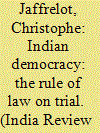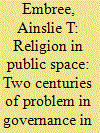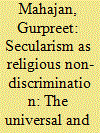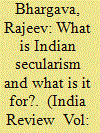| Srl | Item |
| 1 |
ID:
022616


|
|
|
|
|
| Publication |
Jan 2002.
|
| Description |
77-121
|
| Summary/Abstract |
The unprecedented rise of corruption and the criminalization of politics in India are a threat to her democratic regime. This development is not due to the personality of the key figures of post-independence India, but stems from socioeconomic and political conditions: the "licence raj" led businessmen to bribe bureaucrats and politicians to get their projects cleared; its dismantlement under Delhi's economic liberalization policy generates even more corruption since the Indian economy offers more revenue-making opportunities. Besides the impact of these changing economic structures, the rising cost of elections under an ever competitive policy increases the politicians' search for money. However, the rule of law still has defenders. India has a robust judiciary and a virtually independent Election Commission. The "judicial activism" on which the former embarked in the 1990s has certainly made some impact. The Election Commission has also seriously pursued its role of protecting the public scene from the gangrene of crime.
|
|
|
|
|
|
|
|
|
|
|
|
|
|
|
|
| 2 |
ID:
022615


|
|
|
|
|
| Publication |
Jan 2002.
|
| Description |
54-76
|
| Summary/Abstract |
This article examines historical developments over the past 200 years, but especially in the nineteenth century, that provide the background and context for defining the relationship between the state and religious institutions in modern India. That relationship was described by the British government of India as a policy of neurality and non-interference; the declaration in India's Constitution that India is a secular state appears to be a reiteration of this position. Yet the acrimonious discussion surrounding the meaning of "secular" in contemporary India indictes that the issue is far more complex. Early manifestations of this issue can be traced to contradictorary pressures on India's British rulers. Christian groups objected to the East India Company continuing the policy of the former Muslim rulers of giving support to Hindu and Muslim religious institutions, and to the Company's refusal to permit missionaries to work in its territories. Other groups feared any government support for Christian activity that attacked Hindu and Muslim beliefs and practices. Still others argued that in becoming rulers, the British had made a "compact" to preserve Indian rights and usages. Non-interference or the "colonial compromise" was a policy to deal with these pressures. The colonial government, like India's present day government, was continually forced to become involved in religious activities; non-intervention, then, like secularism today, was an attempt to work within the framework of Indian social and political realities.
|
|
|
|
|
|
|
|
|
|
|
|
|
|
|
|
| 3 |
ID:
022614


|
|
|
|
|
| Publication |
Jan 2002.
|
| Description |
33-53
|
| Summary/Abstract |
Secularism everywhere represents the ideal of religious non-discrimination, but different countries pursue different paths to realize this end. Beginning with this understanding, this article rejects narratives about the uniqueness of Indian society and its conception of secularism. It elucidates the foundational principles embodied in India's constitution and argues that India chose not to follow the policy of "separation." Like many countries in Europe, India pursued religious non-discrimination by ensuring equal liberty for all communities. However, what set India apart is that equal liberty for all communities was not accompanied by a parallel strong emphasis on individual liberty. The policy of equal religious liberty was an extension of the principle of equality of all communities in the public domain. This fundamental norm is today under siege from votaries of cultural majoritarianism. What is at stake in the present-day conflict therefore is not simply religious freedom of minorities but the commitment to equality of all.
|
|
|
|
|
|
|
|
|
|
|
|
|
|
|
|
| 4 |
ID:
022613


|
|
|
|
|
| Publication |
Jan 2002.
|
| Description |
1-32
|
| Summary/Abstract |
This article challenges the argument that the conceptual and normative structure of secularism in India is itself terribly flawed. It shows that, first, ignoring the plurality within the western secular tradition, criticisms of secularism are directed against a particular, unattractive and perhaps least defensible variant of secularism for which religion must necessarily be privatized; and, second, that they wrongly identify this variant to be providing normative guidelines to the Indian state. Third, what developed in India is a distinctively Indian yet modern variant of secularism that, rather than erect a strict wall of separation, proposed a "principled distance" between religion and state. Further, by balancing the claims of individuals and religious communities, it never intended a bludgeoning privatization of religion. It also shows that a departure from a strict liberal-individualist model does not compromise the core principles of secularism
|
|
|
|
|
|
|
|
|
|
|
|
|
|
|
|